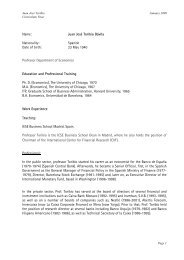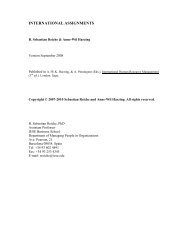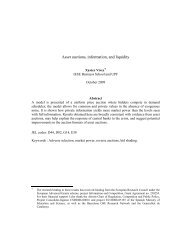Panel Speakers - IESE Blog Community - IESE Business School
Panel Speakers - IESE Blog Community - IESE Business School
Panel Speakers - IESE Blog Community - IESE Business School
You also want an ePaper? Increase the reach of your titles
YUMPU automatically turns print PDFs into web optimized ePapers that Google loves.
Code: 1.e<br />
What it means to pursue a Career in CSr<br />
<strong>Panel</strong> Descriptions<br />
As sustainability in corporations becomes ever more important for employment decisions, people are evaluating<br />
the different challenges and opportunities that it presents. This panel will examine various career<br />
paths available for students and professionals who want to work for sustainable companies. Moreover,<br />
how can this inspire career change and promote growth? We will also focus on how to differentiate greenwashing<br />
from a legitimate commitment to social and environmental awareness.<br />
Moderator: Prof. Joan Fontrodona - <strong>IESE</strong> <strong>Business</strong> <strong>School</strong><br />
<strong>Speakers</strong>: David Lehrer - Conatix<br />
Thomas Osburg - Intel GmbH<br />
Giselle Weybrecht - Author, The Sustainable MBA<br />
panel coordinator: Christina Shin (MBA 2012)<br />
Code: 1.f<br />
The approach to Social responsibility within business <strong>School</strong>s<br />
<strong>Business</strong> schools have been criticized for their role in creating a tribe of money hungry and irresponsible<br />
individuals with little regard for Social Responsibility (SR). These feelings have echoed throughout the media,<br />
especially after the financial crisis. <strong>Business</strong> schools have reacted by implementing Hippocratic oaths<br />
for MBAs, employing more ethics driven courses and investing in PR to show involvement of their students<br />
in various not for profit causes. Are business schools doing enough to ensure that their students internalize<br />
concepts of social responsibility? Is the availability and frequency of ethical classes something that companies<br />
consider before recruiting in MBA programs? Are SR and profitability complementary or mutually<br />
exclusive? Join us in a lively discussion to determine whether business schools should focus more on educating<br />
their students on SR for the benefit of society at large, or whether the media is being too idealistic in<br />
trying to find a home for SR within business schools.<br />
Moderator: Prof. Antonino Vaccaro – <strong>IESE</strong> <strong>Business</strong> <strong>School</strong><br />
<strong>Speakers</strong>: Prof. Antonio Argandoña – <strong>IESE</strong> <strong>Business</strong> <strong>School</strong><br />
Ignasi Faine - AGBAR<br />
Pedro Fernandez - BAT<br />
panel coordinator: Esther Olale (MBA 2012)<br />
2011 Doing Good and Doing Well<br />
15






